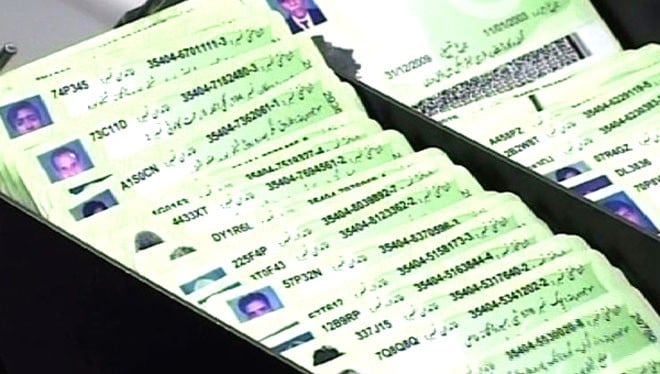
Women without the national identity cards are beginning to realise how crucial it is to have an identity -- and to vote

It may be hard to believe in this day and age but there are women in Pakistan who do not understand why it is urgent or even necessary to have a Computerised National Identity Card (CNIC) for a woman. Their sheer ignorance on this issue stems from many factors, including lack of awareness, a male-dominated society, or mere revulsion to going through the hassle of getting an ID card made.
Nasreen Bibi is one such woman. In her late fifties and working as help in a housing society in Lahore, she is curious why not having an ID card can be a problem, "I never thought about having one. I never required one," she says. "My husband has an ID card and he takes care of everything, from casting a vote to getting children admitted to school," she says, seeming to believe that her husband casting a vote relieves her of her duty to cast one.
Nasreen’s daughter goes to school while her three sons are doing on-job training as electricians. Only her youngest son has got an ID card.
In the course of the discussion, Nasreen somewhat realises that ID cards are a must to show one’s identity besides availing many other advantages, including vote, "I will certainly get an ID card for my daughter when she grows up."
Nasreen is one of the 12 million unregistered women voters, according to the Election Commission of Pakistan (ECP).
Maryam Munir, another domestic help in a housing society, does not have an ID card. She knows that she cannot purchase a mobile phone connection or cannot sell or purchase land or secure a bank loan. But it was only until recently that she was content being a dependent on her husband or sons for all these facilities if she ever required them. The announcement of Benazir Income Support Programme (BISP) changed all that. And in her case, the change came only a month ago when she came to know about BISP.
"My son will take me to the Nadra office soon," she says. When asked if she had ever voted or required CNIC at any particular time, she says, "What is the use of voting? Do our leaders care for us?" She agrees though that she needs to vote even if to de-seat a leader she doesn’t like.
According to the ECP’s recent figures, of the 97.02m people registered as voters, 56.27 per cent are men while 43.73 per cent are women. It is disturbing to note that the gap between male and female voters has now gone up to 12.17m from 10.97m in March 2013.
Nasreen and Maryam represent a considerable number of women scattered all over Pakistan who do not fully realise the importance of having a CNIC.
Read also: Less than half the sky
While the number of women without an ID card is shocking, the situation can be tackled, if not totally reversed at the moment, says Shahana Malik, a councilor from district Chiniot. Unregistered women, she urges, have to be helped out to get their CNICs. "There is the issue of awareness, of mobility, of access, etc. Nadra mobile vans do come here sometimes but they should come more often. Most women are dependent on men to go from one place to another, especially for visiting a government office."
Another major problem Malik points out is the mindset, "There was a time when we would ask older women to get ID cards for their daughters and they would say their daughters’ future in-laws will get them ID cards. They believed it was not the parents’ duty."
That mindset may be gradually changing because today ID card is a requirement for so many things. "People are becoming aware but a lot has to be done," she says, adding, "Still, many women in nearby villages worry that making ID cards for their daughters will make their real age official and intractable, thus, if they do not marry them off soon it will be difficult to find a suitable match for them."
Nishat Fatima, a social worker from Tehsil Mailsi, district Vehari, explains why it is difficult for every woman to get an ID card and to vote in the area. "Tehsil Mailsi is Punjab’s biggest tehsil but it is very backward. The waderas here have the final say in almost every matter, especially politics. So, for women to raise their voice for their rights is not an easy thing."
She says she doesn’t have accurate data but "it would perhaps not be an exaggeration to say that a large number of women here do not have identity cards in the first place."
Fatima also mentions the socio-economic factors, "Women here will not want to waste the whole day for getting their ID cards or to queue up to cast their vote when they can earn Rs200 a day for working in the fields. But I think when it comes to having ID cards or the realisation to vote, city areas of various districts present a better picture than the adjoining villages, which are more backward."